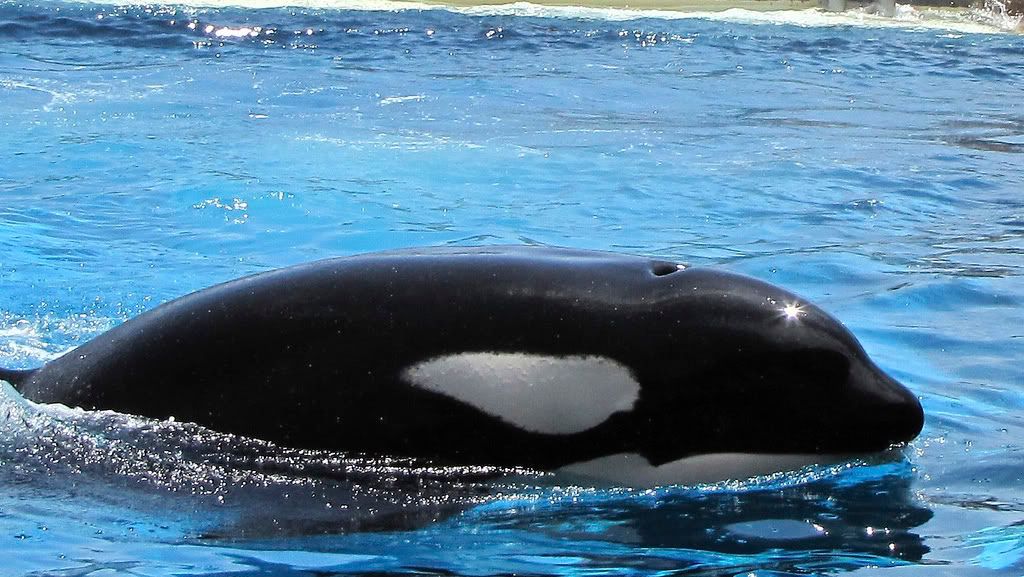
First, I have to say that I was sad to hear about the death of the killer whale trainer Dawn Brancheau.
The killer whale incident is a tragedy but it also got me to thinking about how disconnected people are to what animals really are and the risks that come with that dream career of working with animals.
You might be their buddy, might know the animal really well, but the bottom line is that they are animals.
Sometimes they are wild animals that live in captivity (or were born in captivity) and that are also predators.
Predators such as orcas (aka killer whales).
Any time you work closely with a captive wild animal there is risk.
It might make some difference if they trust you and you are their pal but in other situations–one thing can go wrong and that is the end.
I’ve lost several colleagues that way.
But in case you are not getting this, let me be completely clear:
Death or dismemberment by an animal attack is an occupational hazard for animal trainers or caretakers.
Latest reports (mentioned on my media blog) say that witnesses collaborate on the fact that the killer whale trainer was pulled into the water after Tilikum grabbed her pony tail.
Some people speculated that perhaps Tilly was playing.
Okay, big animals that want to play with you can seriously injure you.
I’ve been close to that before but these guys were dismissing the danger using the example behavior of “playing” with the seals to illustrate the behavior that occurred at Sea World.
Huh? Were they there? Did they see the incident?
You’ve know the footage I am talking about, right?
The one where the orca grabs the seal, pushes it, whomps it with the flukes, bats it into the air, and basically tenderizes it as a way to dispatch the prey.
I’ve got news, that is predatory behavior and I liken it to playing with your food, you intend to eat it (or kill it).
I’ve only witnessed two types of things happen when trainers or caretakers die.
The first is human error and the second is from the actions taken by the animal.
It is the very size and strength of the animal that damages us wee humans but sometimes they just lash out, you know, like an animal.
Now this latest killer whale incident brought back the helplessness I felt as a trainer when in the water with a large animal who decides to toy with you.
I’ve been there and it is the only time I’ve been close to panic when working an animal.
I was the guest of the institution not on the training staff. The main reason for the panic was the failure of the assistant trainer to pull me out of the water when I asked him–and because I knew if the animal pinned me on the bottom of the tank that they had no contingency plans or tools to save my life.
Okay so, animals that are your friends can maim or kill you.
Got that?
I did. I knew that going into this field and some of those people I knew early in my career thought I was silly for being so cautious.
Then there was the other side of the coin when a relative said that she was afraid that one day the phone would ring with the news would that I had been killed by an animal.
Eewwh! But, it is an occupational risk especially if you are working with big animals, predators–or things that have claws, teeth, and beaks.
So, I have ask you–ever think of this type of situation as an occupational hazard?
Would it change your intent to pursue an animal career?
BTW: Tilikum has been associated with two other incidents and now people are irresponsibly calling him a “serial killer” whale. Seriously folks this is not funny and not a joke to those of us in the profession or to those who were family or who worked with the people who were killed by this orca.


Your honesty is so refreshing. You sound like my husband. It is a risk indeed, no matter how much we love those gentle giants (or any other animals). Remember the incident for Sigfried/Roy in Las Vegas – and no two men could have loved any animal more than them. I am in love with the gentle giants of the sea, especial the ones visiting the Maui waters in the winter but alas, we cannot forget that they are predators and that we cannot take such risks with mother nature. Beautifully expressed, and I am very sorry for loss of your friends/colleagues….but glad to hear of your awareness to reality!
Thanks for stopping by Farnoosh.
Quite frankly, I would not call them gentle giants–because they aren’t and I also commented on the S&R incident. People want to dismiss the dangers and overlook the animal nature–the predatory nature.